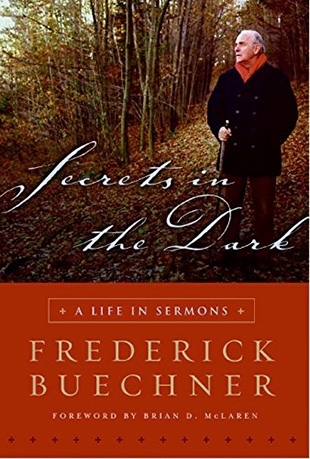Years ago, writer and Presbyterian minister Frederick Buechner stated that the preacher's task is to "hold up life to us; by whatever gifts he or she has of imagination, eloquence, simple candor, to create images of life through which we can somehow see into the wordless truth of our lives." Amen. This top-drawer collection of sermons stretches back to "The Magnificent Defeat" which he preached in 1959 when he was fresh out of seminary and working as the minister at Phillips Exeter Academy. The rest have been published previously in other collections except "The Seeing Heart," "Let Jesus Show," "Jairus's Daughter," "Waiting," "The Word of Life," and "A 250th Birthday Prayer." Also included are some talks, including "Faith and Fiction" and "Adolescence and the Stewardship of Pain." Brian D. McLaren salutes Buechner in the introduction for serving as a vibrant and creative role model for a new generation of preachers who are fed up with the status quo and the worn-out language of Christian dogmatism.
Again and again in these sermons Buechner challenges us to pay attention to the small stuff in our lives. Oftentimes we miss epiphanies because we are not alert and listening. In " Message in the Stars,' he observes:
"I believe that we know much more about God than we admit that we know, than perhaps we altogether know that we know. God speaks to us, I would say, much more often than we realize or than we choose to realize. Before the sun sets every evening, he speaks to each of us in an intensely personal and unmistakable way. His message is not written out in starlight, which in the long run would make no difference; rather, it is written out for each of us in the humdrum, helter-skelter events of each day; it is a message that in the long run might just make all the difference."
Buechner has much to say about Jesus but he refuses to rely on the traditional clichés about him. He always approaches him with respect and never tries to explain away the mysteries. In "The Two Stories," he states:
"The story of Jesus is full of darkness as well as of light. It is a story that hides more than it reveals. It is the story of a mystery we must never assume we understand and that comes to us breathless and broken with unspeakable beauty at the heart of it, yet is by no means a pretty story, though that is the way we’re apt to peddle it much of the time."
Buechner wins us over with his reflections on the spiritual practice of kindness in "Growing Up," on joy and the peaceable kingdom in "The Great Dance," and on the power of love in "Paul Sends His Love." Sunshine and shadow are always in tandem, according to Buechner, and so these sermons are eminently relevant to the dark times in which we live.
